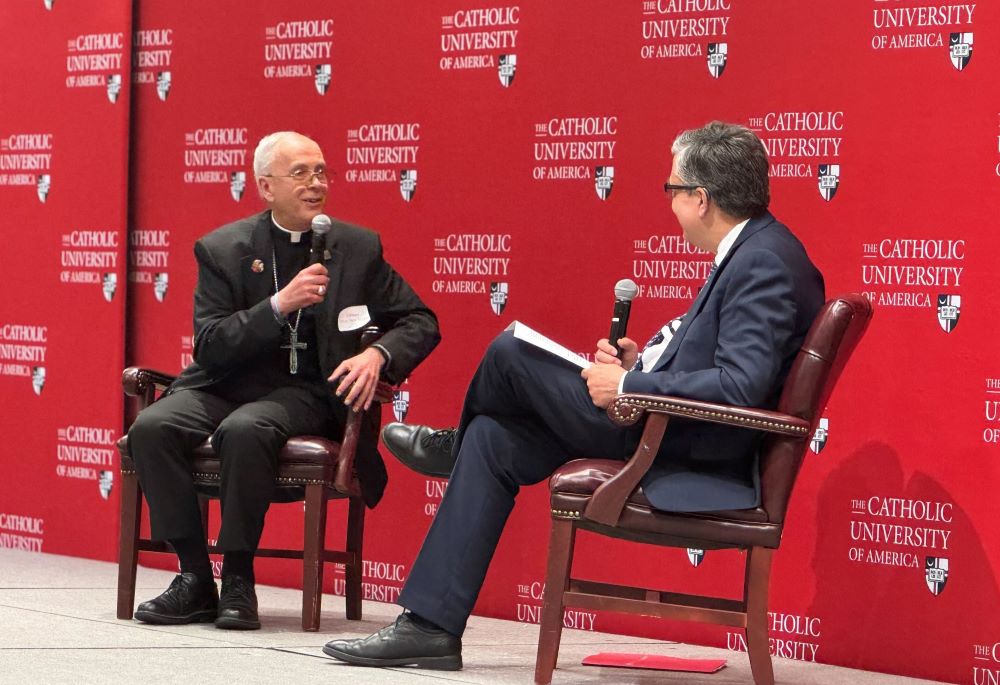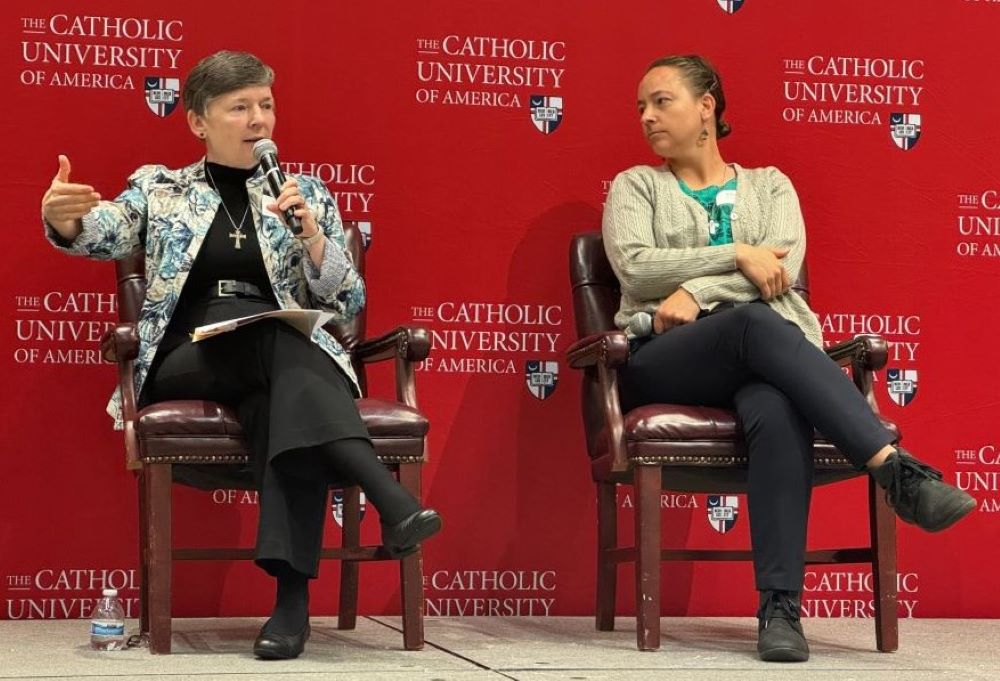
El Paso Bishop Mark Seitz, left, talks with Peter K. Kilpatrick, president of The Catholic University of America, during a daylong conference on immigration the university hosted with the U.S. Conference of Catholic Bishops April 11 in Washington. (NCR photo/Rhina Guidos)
The bishop leading the U.S. Catholic Church's response on migration issues said that both major political parties are inflaming anti-immigrant sentiment in the country.
"Both parties [are] becoming anti-immigration," said El Paso Bishop Mark Seitz, speaking April 11 at a conference at the Catholic University of America.
"[We] can't just say 'Catholics are Democrats,' or 'Catholics are Republicans' on the immigration issue," said the prelate, chairman of the U.S. bishops' migration committee. "I almost feel like we've lost both of them."
Seitz has long supported efforts to care for migrants at the U.S.-Mexico border and recently said officials in his state of Texas are militarizing the border and criminalizing migrants. He made the comments during the "Responding to Changing Realities at the U.S. Border and Beyond" conference, which featured several Catholics in ministry at the border.
Asked by an audience member how he would advise Catholics to vote in the 2024 presidential election, Seitz said that while a candidate's policy positions are important, it's also important to consider their personal character. "Policy positions change according to political winds," he said.
'I believe the situation of immigrants in the United States at this time presents us with the opportunity as well as the obligation to be prophets.'
—Holy Cross Sr. Sharlet Wagner
The conference was co-hosted by the U.S. Conference of Catholic Bishops. The daylong event delved into the history of Catholic response to immigration to the U.S., its connection to Gospel teachings urging Christians to "welcome the stranger," and modern-day responses toward those trying to put that teaching into practice.
U.S., Holy Cross Sr. Sharlet Wagner said that in her mission to help newcomers start new lives one of the biggest challenges she sees migrants and refugees face is the "anti-immigrant sentiment in our country."
Politicians are "using immigrants as political footballs," said Wagner, executive director of the Newcomer Network at Catholic Charities in the Archdiocese of Washington. She said immigration into the U.S. gives Catholics the chance to practice some of the church's core teachings.
"I want to talk a little bit about the opportunity we have, which is the opportunity to be prophetic," she said. "I hesitate to say that because I tend to shy away from self-proclaimed prophets, but I do believe this influx of newcomers gives us an opportunity to be prophetic in the best sense of that word."
"Prophets point out to society where it's going astray," said Wagner. "Prophets speak the truth about God and about what God is calling us to. Prophets call us to do better and to be better."
"When we hear about the immigration crisis in this country, I don't think of it as an immigration crisis so much as a moral crisis," she said. "I believe the situation of immigrants in the United States at this time presents us with the opportunity as well as the obligation to be prophets, to point out where we're going wrong in our treatment of the stranger."

Holy Cross Sr. Sharlet Wagner, left, talks about the Catholic Church's work with migrants and refugees, as Sr. Tracey Horan, of the Sisters of Providence of St. Mary-of-the-Woods, looks on. The two spoke during the "Responding to Changing Realities at the U.S. Border and Beyond" conference at the Catholic University of America in Washington April 11, 2024. (NCR photo/Rhina Guidos)
Sr. Tracey Horan, associate director of the KINO Border Initiative, highlighted the work of people trying to help immigrants on the frontlines of the U.S.-Mexico border. Horan, of the Sisters of Providence of St. Mary-of-the-Woods, Indiana, said it's hard to keep track of rapidly changing immigration policies and rules and figure out how to help people in need.
"Confusion and uncertainty go hand in hand with policy changes that happen and that are complex because they affect people from different countries of origin differently," Horan said. "Helping people understand what that means for them is a big challenge."
Oblate Fr. Leo Perez is director of the U.S. bishops' Subcommittee on the Church in Latin America, which funds pastoral projects at dioceses in the Caribbean and Latin America. He said that because of the scale of immigration in the Americas, "we do relief work" in emergency situations, which has led to him to witness up close mass movements of people in desperate situations.
"My work is where people are beginning their journey before they cross the border. … we talk about the journey north, but some people, they start the journey going south," he said. "If you've gone to South America recently, in any capital city you go to, there's thousands of immigrants. … they're Haitians, they're Cubans, they're Venezuelans."
Fleeing political, economic or situations of mass violence, most aim to stay in countries where they speak the language, Perez said, but sometimes the "destination changes because of changing economies and other situations."
Perez's office oversees the U.S. bishops' Collection for the Church in Latin America. He spoke of the collection's aid for the border city of Cúcuta, Colombia, near a bridge Venezuelans cross toward Colombia.
He remembered being on a visit to the bridge and seeing a Venezuelan man there, who was pulling his sick daughter in a little cart, and stopped to ask another priest for help. The priest gave him money for medicine and then looked at the child.
"I don't think the dad had looked at her in a while. She was jaundiced and it looked like she was in her last few hours. The priest immediately took out his holy oils" and anointed her, Perez said, trying to hold in tears. "I saw it in the dad's eyes. He realized she was done."
Yet migrants are often portrayed as a threat, not as people fleeing horrific situations and any attempt to talk about them in homilies as such is often met with attacks, "being called a communist and all that," Perez said.
Advertisement
While surges in migration do occur, Seitz said, portrayals usually do not accurately reflect the situation on the ground.
"I don't think it's nearly as overwhelming a situation as it's often painted — 'crisis on the border,' that kind of thing," he said. "But it does call for everyone, the different elements in society, to step up, and if we do, we find the capacity to do amazing things."
Sr. Deirdre Griffin, an immigration attorney and member of the Sisters of St. Joseph, was one of the event's approximately 250 participants. She is currently in ministry at the U.S./Mexico border in El Paso Texas with Maryknoll Lay Missioners*. Griffin said she wanted to see a more "publicly recognizable message" from a wider swath of bishops from around the country in support of immigrants, urging more help "on the ground," in more U.S. parishes.
"My concern is that the pressure of the current political situation will stifle that. Rather than us choosing to be prophetic like Sr. Sharlet was talking about and to do more," she said. "I know Bishop Seitz is leading, but my concern is that other bishops around the country are not taking it on."
Seitz said the country has a choice in how to respond to migrants. "This is a key moment, and we will either thrive or not thrive as a nation in the future," he said.
*This story has been updated to correct the spelling of Sr. Dierdre Griffin's name and note her current ministry.








